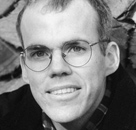 Bill McKibben to lecture at Wheaton College
Bill McKibben to lecture at Wheaton College
Tuesday, March 31, 2009
4 PM, Adams Lecture Hall
"The Most Important Number in the World: Building a Movement to Defend Creation." (mp3)
and 7 PM, Phelps Room, Beamer Center
"Are we in an age of missing information?" (mp3)
Bill McKibben's book, The Age of Missing Information, is of particular interest to CACE. Acclaimed environmental writer and culture critic Bill subjected himself to this sensory overload in an experiment to verify whether we are truly better informed than previous generations. Bombarded with newscasts and fluff pieces, game shows and talk shows, ads and infomercials, televangelist pleas and Brady Bunch episodes, McKibben processed twenty-four hours of programming on all ninety-three Fairfax, Virginia, cable stations. Then, as a counterpoint, he spent a day atop a quiet and remote mountain in the Adirondacks, exploring the unmediated man and making small yet vital discoveries about himself and the world around him.
Bill McKibben is an American environmentalist and writer who frequently writes about global warming, alternative energy, and the risks associated with human genetic engineering. Beginning in the summer of 2006, he led the organization of the largest demonstrations against global warming in American history. McKibben is active in the Methodist Church, and his writing sometimes has a spiritual bent.
Bill grew up in suburban Lexington, Massachusetts. He was president of the Harvard Crimson newspaper in college. Immediately after college he joined the New Yorker magazine as a staff writer, and wrote much of the "Talk of the Town" column from 1982 to early 1987. He quit the magazine when its longtime editor William Shawn was forced out of his job, and soon moved to the Adirondack Mountains of upstate New York.
Bill McKibben, a scholar-in-residence at Middlebury College since 2001, is a former staff writer for the New Yorker and the author of numerous books.
Promoting and encouraging the formation of moral character and the application of biblical ethics to contemporary moral decisions
